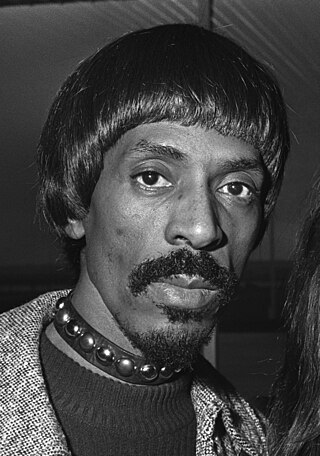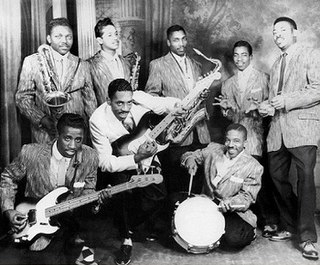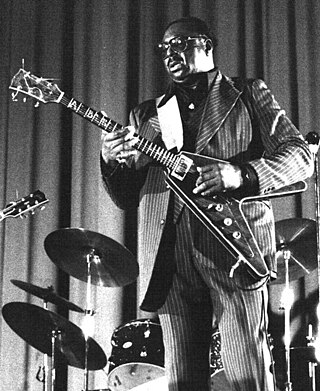Related Research Articles

Izear Luster "Ike" Turner Jr. was an American musician, bandleader, songwriter, record producer, and talent scout. An early pioneer of 1950s rock and roll, he is best known for his work in the 1960s and 1970s with his wife Tina Turner as the leader of the Ike & Tina Turner Revue.

Riley B. King, known professionally as B. B. King, was an American blues guitarist, singer, songwriter, and record producer. He introduced a sophisticated style of soloing based on fluid string bending, shimmering vibrato, and staccato picking that influenced many later blues electric guitar players. AllMusic recognized King as "the single most important electric guitarist of the last half of the 20th century".

Robert Calvin Bland, known professionally as Bobby "Blue" Bland, was an American blues singer.

The Kings of Rhythm are an American music group formed in the late 1940s in Clarksdale, Mississippi and led by Ike Turner through to his death in 2007. Turner would retain the name of the band throughout his career, although the group has undergone considerable line-up changes over time.

Bobby Rush is an American blues musician, composer, and singer. His style incorporates elements of blues, rap, and funk.

Albert Nelson, known by his stage name Albert King, was an American guitarist and singer who is often regarded as one of the greatest and most influential blues guitarists of all time. He is perhaps best known for his popular and influential album Born Under a Bad Sign (1967) and its title track. He, B.B. King, and Freddie King, all unrelated, were known as the "Kings of the Blues". The left-handed Albert King was known for his "deep, dramatic sound that was widely imitated by both blues and rock guitarists."

Rosco N. Gordon III, sometimes billed as Roscoe Gordon, was an American blues singer, pianist, and songwriter. He is best known for his hit songs "Booted," (1952), "No More Doggin'" (1952), and "Just a Little Bit" (1960). Gordon was a pioneer of the Memphis blues style. He played piano in a style known as the "Rosco rhythm," with the emphasis on the off-beat. This rhythm was an influence on later musical styles such as Jamaican ska and reggae.
Willie Nix was an American Chicago blues singer and drummer, active in Memphis, Tennessee, in the 1940s and 1950s.
The Bihari brothers, Lester, Jules, Saul and Joe, were American businessmen of Hungarian Jewish origins. They were the founders of Modern Records in Los Angeles and its subsidiaries, such as Meteor Records, based in Memphis. The Bihari brothers were significant figures in the process that transformed rhythm and blues into rock and roll, which appealed to white audiences in the 1950s.
The Blues is a 2003 documentary film series produced by Martin Scorsese, dedicated to the history of blues music. In each of the seven episodes, a different director explores a stage in the development of the blues. The series originally aired on PBS in the United States.

Bennie Ross "Hank" Crawford, Jr. was an American alto saxophonist, pianist, arranger and songwriter whose genres ranged from R&B, hard bop, jazz-funk, and soul jazz. Crawford was musical director for Ray Charles before embarking on a solo career releasing many well-regarded albums for labels such as Atlantic, CTI and Milestone.
Godfathers and Sons is a documentary directed by Marc Levin. The film is part of The Blues, a seven part PBS series, with Martin Scorsese as executive producer.
Richard "Tuff" Green was an American jazz and R&B bassist and bandleader.
Robert Gordon is an American writer and filmmaker from Memphis, Tennessee. His work has focused on the American south—its music, art, and politics—to create an insider's portrait of his home, both nuanced and ribald.

This article contains information about albums and singles released by of American musician and bandleader Ike Turner.
Earl Forest was an American musician and a member of the Memphis-based R&B coalition called the Beale Streeters, which included Johnny Ace, Bobby Bland, Junior Parker, B.B. King, and Roscoe Gordon. Forest had a hit record in 1953 with "Whoopin' And Hollerin'" on Duke Records. He also recorded for Meteor Records and Flair Records.

"No More Doggin'" is a rhythm and blues song written and originally recorded by blues musician Rosco Gordon in 1952. The song featured Gordon's signature "Rosco Rhythm" piano style which became a precursor to Jamaican ska music.
The Beale Streeters were a Memphis-based R&B coalition of musicians, which at times included John Alexander, Bobby Bland, Junior Parker, B.B. King, Earl Forest, Willie Nix, and Rosco Gordon. Initially, they were not a formal band, but they played at the same venues and backed each other during recording sessions.
Leon Blue is an American pianist. He has played with Ike & Tina Turner, Lowell Fulson, Albert Collins, B.B. King, Albert King, Roy Milton, Little Joe Blue, and many others. Blue also recorded as a member of the Manish Boys.
Colin Escott is a British music historian and author specializing in early U.S. rock and roll and country music. His works include a biography of Hank Williams, histories of Sun Records and The Grand Ole Opry, liner notes for more than 500 albums and compilations, and major contributions to stage and television productions. Honors include multiple Grammy Awards and a Tony Award nomination.
References
- 1 2 Mitchell, Elvis (September 26, 2003). "TELEVISION REVIEW; The Blues: A History, A Homage". The New York Times.
- ↑ Goldberg, Michael Alan (September 25, 2003). "Blues All Around Me". Miami New Times.
- 1 2 3 Gallo, Phil (September 6, 2003). "The Road To Memphis". Variety.